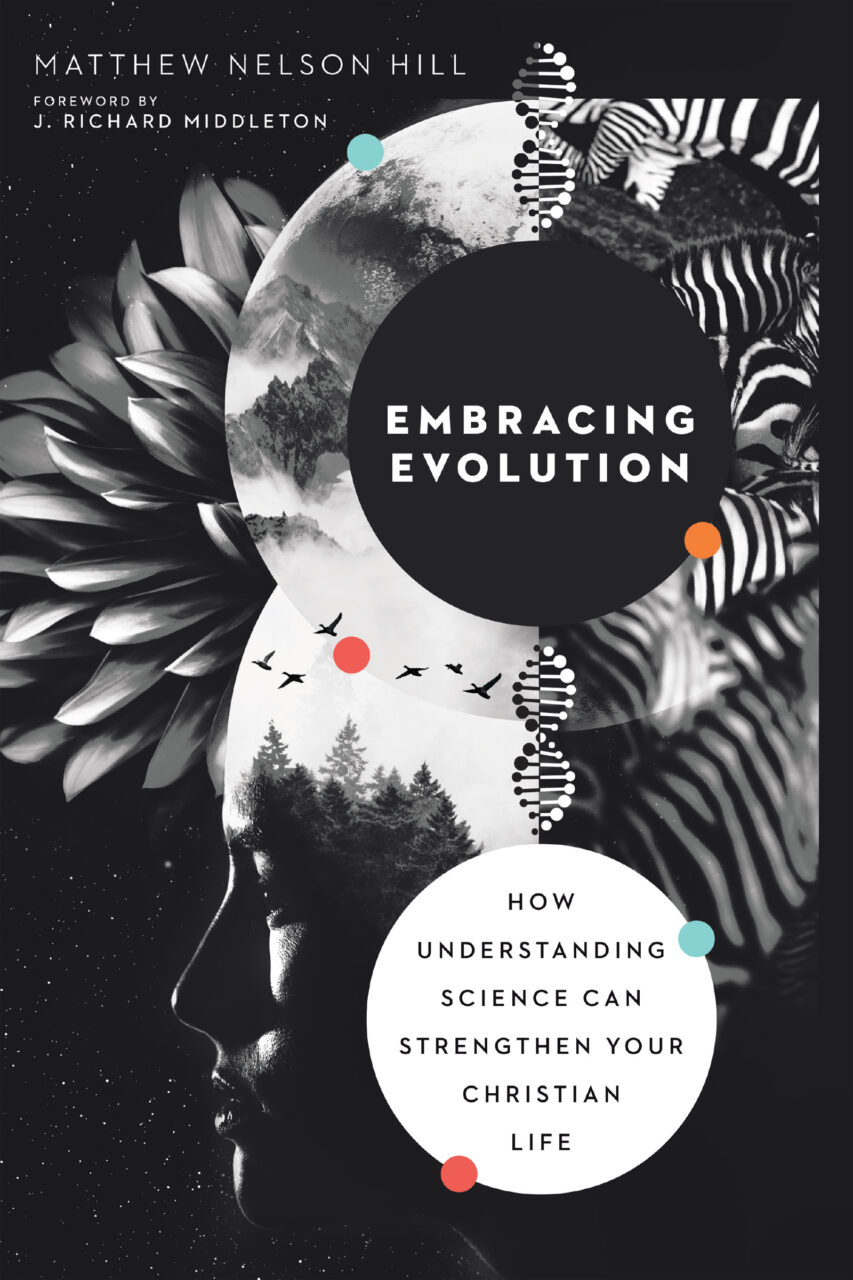Book reviewed by Kathlyn Ronaldson, March 2025
Embracing Evolution: How Understanding Science Can Strengthen Your Christian Life
by Matthew Nelson Hill
Foreword by J. Richard Middleton
Downers Grove, Illinois: IVP Academic, 2020; 156 pages
ISBN 9780830852833, first edition, paperback
AUD$31
Hill has written a book which is accessible and chatty in style to persuade the general Christian reader that, rather than there being reason to fear accepting that humans have developed from a process of evolution, there is instead much to be gained for the pursuit of holiness from understanding our roots.
After explaining his objectives in Chapter 1, his next chapter is entitled “Reading Scripture Faithfully” and he draws on what is called in the Wesleyan tradition, “the quadrilateral” of Scripture, church tradition, reason, and personal experience with God. For those who might have reservations about the role of traditions, he points out that major church doctrines such as the Trinity, and the dual divine and human nature of Christ, were thrashed out in ecumenical councils. He addresses the question of mode of interpretation, literal or otherwise, and cites Augustine (and later in the book Irenaeus, Basil the Great, Origen, and others) as an early Christian theologian with a non-literal interpretation of Genesis 1–3. He asserts that Scripture, including Genesis 1–3, is to be read for formation not information.
In Chapter 3, “Adam and Eve, the Fall, Predation, and Death,” Hill admits to some uneasiness around the suffering and destruction which the evolutionary process has involved and is ongoing in the world today. However, “death is … a necessary ingredient for life. In the great chain of existence, if organisms don’t die then life cannot spring forth” (p. 40). Furthermore, Christ’s death brings life, and his resurrection was only possible because he died. In this same chapter he claims that many biologists believe that humans have a single male ancestor. It is my understanding that genetic evidence indicates that the original humans were a population of tens of thousands (see BioLogos Editorial Team, “Adam, Eve and Human Population Genetics” BioLogos 2014, updated 2021), although mitochondrial DNA points to a single female ancestor. The mitochondria of a woman with no female offspring are not carried to future generations and by this process the mitochondria of a single woman came to dominate.
Chapter 4, “The Nuts and Bolts of Evolution,” is where I have serious reservations. Hill is a philosopher and theologian, not a scientist. He would have been well advised to have had a scientist as a coauthor. This is one example of my objections: He suggests that the variation in the arrangement of DNA between closely related species is like the difference between the arrangement of German letters in Mein Kampf and Communist Manifesto. This analogy may have some merit as an argument, but it does not further our understanding and is misleading. Most people today have sufficient understanding of the nature of DNA to be given a more meaningful explanation.
Next, in Chapter 5, Hill considers “Relating to Science.” Proposing a constructive method for science and the Christian faith to relate, he draws on Hegel’s concept of thesis and antithesis resolving in sublation with the parts still in tension and retaining their distinctive characteristics. I am certainly with Hill when he states, “We should never fear moving closer to the truth” (p. 80), whether that be in science or theology.
In the sixth chapter, “Understanding Evolutionary Theory Can be Empowering,” Hill gets to the central thesis of the book. If we understand that our impulses for continuous sex and food are primeval, from a time of scarcity and tenuousness of life, we will be better able to resist those temptations, as we understand that we now live in times of plenty. He claims that he has seen many Christians benefit from this understanding, but, frankly, it does not work for me. I am more easily motivated by the words of Scripture outlining for us what pleases our Lord and Saviour and what grieves him. As I see it, Hill is trying to find morality in the Book of Creation, but the only valid source is the Book of Scripture.
The penultimate Chapter 7 discusses the benefit of cooperative communities in contemporary non-human groups and in human evolution: since ‘“tribes of Good Samaritans will out reproduce tribes of thieves”’ (p. 109. Quoted from Holmes Rolston, “The Good Samaritan and his Genes.” In Evolution and Ethics: Human Morality in Biological and Religious Perspective. P. Clayton and J. Schloss [eds], Grand Rapids, MI: Eerdmans, 2004, p. 244)
His last chapter, Chapter 8, discusses the importance of community for the fostering of virtue and holiness, where the community provides accountability and example, as well as recipients of virtuous acts. He completes the book on two significant notes: (1) “[i]n light of our common ancestry, the incarnation elevates all things, not just us [humans]” (p. 129); and (2) to avoid or deny our evolutionary origins is detrimental to our Christian witness.
I do not wish to be overly disparaging, but I feel unable to recommend this book. There are more helpful books available for those who wish for an explanation of the theory of evolution, both for the purpose of understanding the science and to grapple with the implications for faith, for example F. S. Collins’ The Language of God. A Scientist Presents Evidence for Belief (Simon & Schuster, 2007) or D. R. Falk’s On the (Divine) Origin of our Species (Cascade Books, 2023).
As an alternative to Hill’s assertions that understanding the origins of our impulses helps us towards holiness, I would suggest that understanding evolution provides reasons to praise the God of creation; praise changes our hearts and leads to holiness.

